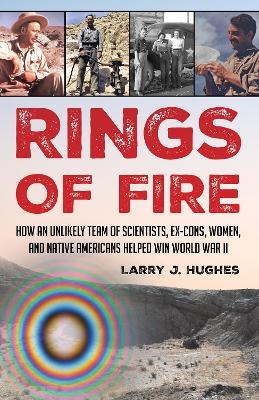
Rings of Fire
How an Unlikely Team of Scientists, Ex-Cons, Women, and Native Americans Helped Win World War II
Seiten
2024
Stackpole Books (Verlag)
978-0-8117-7389-8 (ISBN)
Stackpole Books (Verlag)
978-0-8117-7389-8 (ISBN)
In the weeks after Pearl Harbor, the U.S. military—gunners on naval ships and in antiaircraft units—realized it had a problem: “We couldn’t hit the broad side of a barn.” It urgently needed a gunsight that was easy to use and quick to aim. Enter Edwin Land, founder of Polaroid and self-taught expert in polarizing technology, who very swiftly came up with the idea for the optical ring sight (ORS), in which a set of concentric circles glowed—like rings of fire—for the gunner.
Rings of Fire tells the gripping story of the unique cast of characters whose diverse talents transformed insight into gunsight. Irascible “desert rat,” mineral dealer, and cactus grower John Hilton mined the initial lodes of calcite—essential for the sight, historically in very short supply—in California; General George Patton wanted to take Hilton to North Africa with him, but mining calcite was deemed more important. A crew of misfits—draft dodgers, criminals, a cross-section of the underbelly of America—under a Marine officer did the initial mining, but as production sagged, Native Americans of the Cahuilla tribe were recruited to pick up the slack.
For the rest of the war, calcite production shifted back to California and then to Mexico, where a man with an FBI dossier drove operations, while Polaroid began to develop artificial crystals to fill the needs to produce the ORS. By the end of the war, Polaroid had fabricated hundreds of thousands of calcite-based sights for naval antiaircraft guns and the army’s bazookas—and the technology would be integrated into cameras long after the war, including on the Mercury, Gemini, and Apollo space missions. The famous “Earthrise” photograph was taken using calcite.
Rings of Fire is a story of American ingenuity, determination, and grit. Larry J. Hughes tells the story with accessible explanations of the science and engineering behind the optical ring sight, but always lets the colorful characters drive this vivid history of science and war.
Rings of Fire tells the gripping story of the unique cast of characters whose diverse talents transformed insight into gunsight. Irascible “desert rat,” mineral dealer, and cactus grower John Hilton mined the initial lodes of calcite—essential for the sight, historically in very short supply—in California; General George Patton wanted to take Hilton to North Africa with him, but mining calcite was deemed more important. A crew of misfits—draft dodgers, criminals, a cross-section of the underbelly of America—under a Marine officer did the initial mining, but as production sagged, Native Americans of the Cahuilla tribe were recruited to pick up the slack.
For the rest of the war, calcite production shifted back to California and then to Mexico, where a man with an FBI dossier drove operations, while Polaroid began to develop artificial crystals to fill the needs to produce the ORS. By the end of the war, Polaroid had fabricated hundreds of thousands of calcite-based sights for naval antiaircraft guns and the army’s bazookas—and the technology would be integrated into cameras long after the war, including on the Mercury, Gemini, and Apollo space missions. The famous “Earthrise” photograph was taken using calcite.
Rings of Fire is a story of American ingenuity, determination, and grit. Larry J. Hughes tells the story with accessible explanations of the science and engineering behind the optical ring sight, but always lets the colorful characters drive this vivid history of science and war.
Larry J. Hughes is a geophysicist with forty years’ experience, with much of that time spent in the field in the western United States, focusing on mineralogy and optics. An award-winning painter, he has been Artist-in-Residence for five National Parks and one National Monument. He lives near Memphis, Tennessee.
| Erscheinungsdatum | 28.05.2024 |
|---|---|
| Zusatzinfo | 23 BW Illustrations, 107 BW Photos, 7 Color Illustrations, 25 Color Photos, 3 Maps |
| Verlagsort | Mechanicsburg, Pennsylvania |
| Sprache | englisch |
| Maße | 160 x 236 mm |
| Gewicht | 939 g |
| Themenwelt | Geschichte ► Allgemeine Geschichte ► Neuzeit (bis 1918) |
| Geschichte ► Allgemeine Geschichte ► 1918 bis 1945 | |
| Geschichte ► Teilgebiete der Geschichte ► Militärgeschichte | |
| ISBN-10 | 0-8117-7389-2 / 0811773892 |
| ISBN-13 | 978-0-8117-7389-8 / 9780811773898 |
| Zustand | Neuware |
| Haben Sie eine Frage zum Produkt? |
Mehr entdecken
aus dem Bereich
aus dem Bereich
Europa 1848/49 und der Kampf für eine neue Welt
Buch | Hardcover (2023)
DVA (Verlag)
48,00 €
Giordano Bruno - ein ketzerisches Leben
Buch | Hardcover (2024)
C.H.Beck (Verlag)
29,90 €


